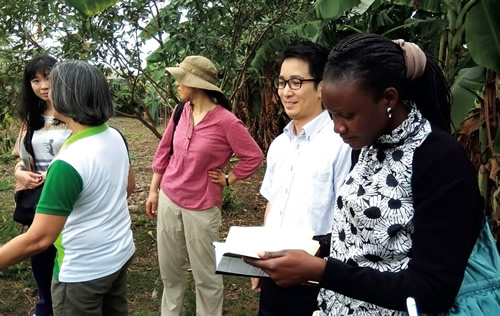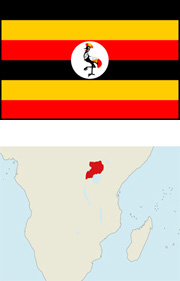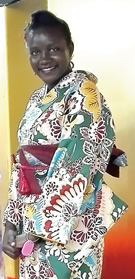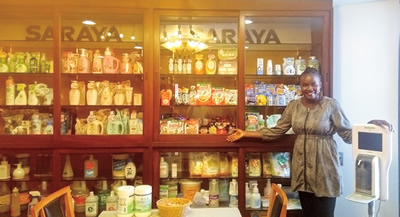Scholars from developing nations have deepened their learning through the links between JICA and universities. Today, they are playing active roles in either their home country or Japan.
Applying the Skills Learned in Japan to Improve Hygiene Back Home:
Ms. Robinah Ajok

She also experienced an internship at Saraya's head office in Japan. "I realized that Japanese people consider efficiency in everything," she says.
Uganda

The spread of COVID-19 has prompted a widespread recognition of the preventative effects of handwashing. However, in Uganda the custom of handwashing has not yet taken root. Consequently, the local subsidiary of the Japanese company Saraya has been producing and selling hand sanitizer, as well as providing training for medical practitioners and helping raise awareness at schools and kindergartens. Ms. Ajok has been supporting these activities since the local subsidiary was first established. Then in 2016, she participated in the ABE Initiative to improve her skills even further.
"My main motivation for coming to Japan was due to the lack of experts in public health at Saraya in Uganda. I was able to learn all sorts of things about health and medicine at Nagasaki University. For example, I visited the Philippines and learned how their health system functioned, and understood how cooperation from Japan was contributing to its health system. I was also able to intern at the World Health Organization's Collaboration Center for Infection Prevention and Control at Geneva University Hospital. Over these three-months I learnt a lot about managing infections," Ms. Ajok explains.

She is able to apply a lot of the specialized knowledge she gained through the Program in her current work. When she proposed a policy that would improve hygiene in medical institutions after returning to Uganda, she explains "I collaborated with a research team from Geneva, and thanks to the research skills I picked up in Japan I was able to present an evidence-based solution."
Her immediate task is to deal with COVID-19, for which hand hygiene is of particular importance. There are only two companies in Uganda making hand sanitizer, and Saraya's high quality product is in great demand. Ms. Ajok describes her present role: "We are currently serving clients from the entire East African region, and there are high expectations towards fighting COVID-19. In addition, we provide expert advice on the location of hand hygiene dispensers in different public places like, schools, banks, offices among others."
In the future, Ms. Ajok hopes to work to disseminate the importance of hygiene in rural communities as well. She also looks forward to working with JICA in the future, saying "I want to continue being a bridge between Africa and Japan."

During fieldwork in the Philippines.
Ms. Robinah Ajok
Chief Hygiene Instructor, Saraya Manufacturing (U) Ltd.
From Uganda. After graduating from university, she joined the local subsidiary of Saraya, a Japanese company. She came to Japan in 2016 to study public health at Nagasaki University. After doing an internship at Saraya's head office, she is now playing an important role as a hygiene expert.
About the ABE Initiative
In this program, young Africans are invited to Japan to both obtain their master's degree at a Japanese university and get the chance to intern with a Japanese company. The aim is to train human resources for African industry and cultivate "navigators" who will support Japanese businesses in Africa. In the five years since its 2014 inception, more than 1,200 young Africans from 54 countries have come to Japan.




scroll